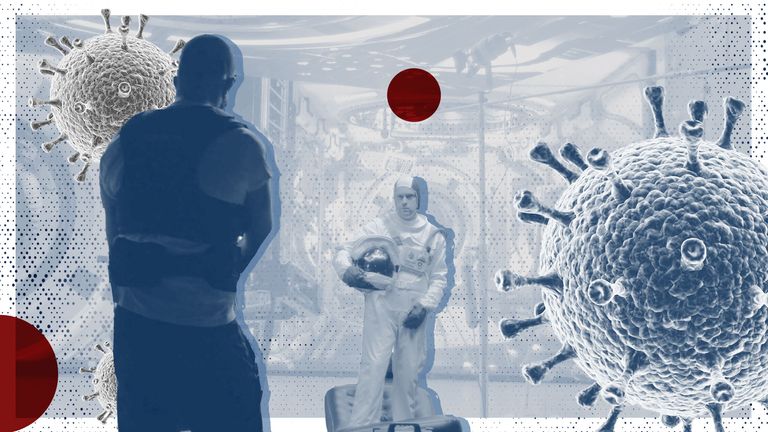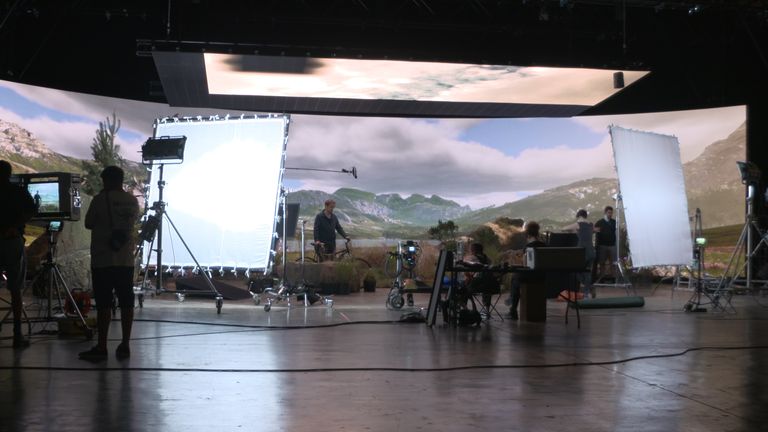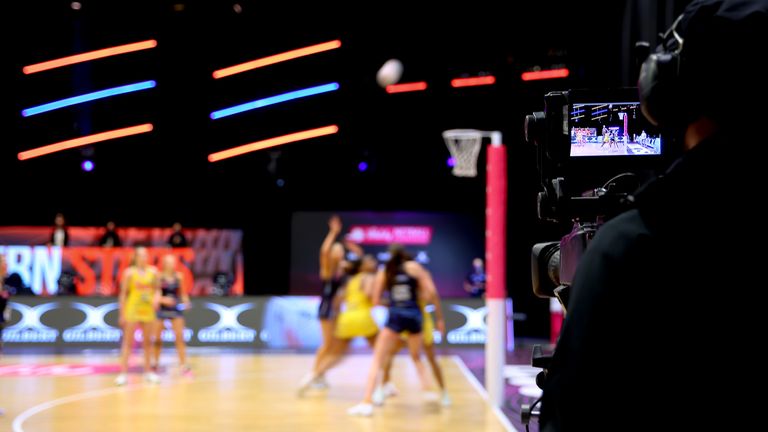COVID-19: Virtual production and 5G delivery - how film and TV crews have adapted during the pandemic
Filmmakers and producers share the changes they have had to make to keep making content in the era of COVID-19.
Wednesday 26 May 2021 09:57, UK
When film and TV production was shut down because of the coronavirus outbreak last year, companies were forced to find new technologies and locations in order to get cameras rolling again.
The demand for content grew as people were stuck inside, and the industry had to innovate in order to meet expectations.
For productions forced to minimise crews, or unable to access certain locations, the roll-out of new virtual production technology - which viewers are most likely to have seen used in Star Wars spin-off The Mandalorian - has accelerated during the COVID-19 crisis.
Described as a successor to green screen, virtual production creates a 3D space using intricate backgrounds made during the pre-production process, meaning actors can interact with their surroundings - and what's around them can be changed at the click of a button.
Mark Pilborough-Skinner, the virtual production supervisor at Garden Studios in London, says interest in the technology has definitely accelerated since the coronavirus outbreak.
"Until about a year or so ago, it was just theoretical more or less, there wasn't many productions actually using it, but now several triple-A productions and even smaller ones are starting to use it," he said. "It has definitely pushed lots and lots of filmmakers that have either had to revise scripts or cancel productions to actually see that they can set their shoots in Brazil [for example].
"They don't have to send a crew of 100 people there - they can either create 3D assets and do it here or they can even send a very small crew to record a video, which they can then use on our screen as a backdrop."
While travel restrictions have meant many countries favoured by filmmakers haven't been available, not all actors have had to completely abandon their ambition to travel.
As a COVID-safe location, the Caribbean island of Nevis has signed a two-picture deal with MSR Media, launching the film industry there.
Fifty members of cast and crew have flown over to work on upcoming film The Assailant, and 40 crew members and seven actors have been hired locally.
Subscribe to the Backstage podcast on Apple Podcasts, Google Podcasts, Spotify, Spreaker
Producer Philippe Martinez says the coronavirus outbreak has had a huge impact on their approach to filmmaking.
"What has changed is now that we're looking first at the safety for the crew and for the actors, because if you start a film in a place where potentially the movie could be stopped and one of the crew members or the cast could be infected with COVID, then it creates a massive problem," he said.
Plans for films that would have previously required multiple locations have also had to be revised.
"It's very difficult to try to [make] a movie in different countries because that means that you will have to move your crew and the cast from one country to another country... that means more quarantine," Martinez said. "So the best is to plan to do at least three films back-to-back in one country, bring the crew for those three films and try to have actors that could be involved in two of the three movies."
And it is not just film crews that have had to adapt.
For fans of live sport who could no longer watch games in stadiums, the pandemic spelled disaster. However, by using remote production, 5G sim cards and delivering via the cloud, Sky Sports has aired more live netball games since the pandemic broke out than it did in 2019.
"Elite women's sport during the pandemic has suffered hugely," said Sky Sports production manager Kate Walkey. "So to be able to go from shooting 20 live netball games pre-COVID, we've enabled showing 114 Superleague games to all our netball fans."
Walkey says that while the need to adapt was ultimately driven by the pandemic, she's confident the changes are here to stay.
"We've had to reduce crew on site, and fortunately with this technology and by pushing this technology it's meant that we can do it cost effectively," she said. "We've certainly had some unexpected challenges along the way... but it's really meant that we're in a situation where this hopefully will become business as usual and we can roll it out across a number of our sports."
The TV and film industry may have been forced to adapt over the last year because of the pandemic - but with some of the new options benefitting not just the productions themselves but also the environment, thanks to the reduced carbon footprint, the changes are likely to be around long after restrictions lift.






